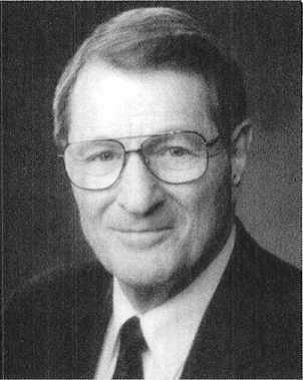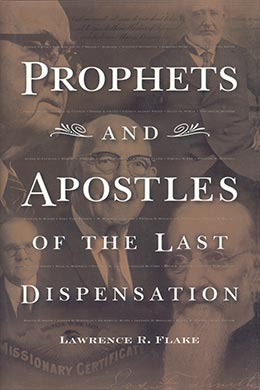Neal Ash Maxwell
Lawrence R. Flake, Prophets and Apostles of the Last Dispensation (Provo, UT: Religious Studies Center, Brigham Young University, 2001), 525–28.

Born: 6 June 1926, Salt Lake City, Utah
Assistant to the Quorum of the Twelve: 6 April 1974
First Quorum of the Seventy: 1 October 1976
Quorum of the Twelve Apostles: 23 July 1981 (age 55)
As a teenager, Neal Maxwell lacked confidence. He was too short to be the star basketball player he had hoped to become, and he raised pigs, which, he said, “didn’t endear me to the social life.” [1] As if that weren’t enough, he got a D in English. He knew he deserved better and told his teacher so. She stunned him by replying, “Neal, you are capable of doing A work. Until you do, you are going to continue to get a D.” [2] He met the challenge, became the coeditor of the school paper, and over the years has become the consummate wordsmith.
This gift has blessed the Church as he has taught the gospel not only with the power of the Spirit but with the beauty of carefully chosen words and eloquently crafted sentences. For example, he wrote, “The home lies at the headwaters of the stream of civilization and we must keep it happy and pure.” [3] Of status and service, he said, “Sometimes . . . in our search for status, [we] get confused about the relationship of status to righteousness. It is not the expanse of the ecclesiastical epaulets we wear on our shoulders, but our willingness to put our shoulder to the wheel that counts!” [4] He explained his motivation to use words well: “The gospel truths are so transcending, even stunning, in their significance they deserve to be clothed in the best language and expression each of us can produce.” [5]
During his boyhood and the Depression, Elder Maxwell’s family moved into a house that initially lacked even the convenience of indoor plumbing. It was at the time of this traumatic experience that Elder Maxwell learned what was really important in life. He said, “Our family coped with that economic comedown in a way that I knew the family and the Church were what really mattered, and I was impressed that my folks could humble themselves and not be bitter and not be cynical.” [6] These difficult times confronted him with the necessity of obtaining work. He washed bottles at a soda water bottling company for twenty-five cents an hour, and at age sixteen he worked as a “grease monkey” at the Greyhound bus garage. Neal had not made any particular plans for attending college, but his experiences as a soldier in World War II and as a missionary in eastern Canada convinced him that he should seek a higher education. In 1952 he graduated from the University of Utah with high honors in the field of political science. He later earned a master’s degree in the same field and has been awarded five honorary doctoral degrees. He was married in 1950 to Colleen Hinckley. They are the parents of a son and three daughters and the grandparents of twenty-four grandchildren.
Elder Maxwell’s competence in the field of political science has enabled him to make significant contributions in government. He served as a legislative assistant to Utah’s Senator Wallace F. Bennett. He was chair of the Utah Constitutional Revision Commission, chair of UTEGO (Utahns for Effective Government), and has been involved in other such organizations that under his leadership have had far-reaching influences. He has also assisted in other kinds of civic endeavors, such as the United Fund, Utah Symphony, Milton Bennion Memorial Foundation, and educational television. Besides all of this, Elder Maxwell has found time to author more than two dozen books. While performing his many civic services, he was engaged full time in his chosen field of higher education. He worked up from assistant public relations director of the University of Utah to executive vice-president of that institution. In 1970 he was appointed commissioner of education for the Church, and in this capacity he supervised all of the seminaries, institutes, elementary schools, high schools, and colleges of the Church, and BYU.
Many Church callings have come to Elder Maxwell over the busy years. He was a bishop, a member of the Young Men’s Mutual Improvement Association General Board, a member of the Adult Correlation Committee, and a regional representative of the Twelve. One evening in April 1974 he answered a knock at the door in his stocking feet and was surprised to find President Spencer W. Kimball standing before him. A few minutes later, in his living room, he was called to be an Assistant to the Twelve. His first address in general conference revealed his eloquence as a speaker much in demand by groups both in and out of the Church. He expressed appreciation for his many blessings and to the Savior “for his atonement, realizing that included in the awful arithmetic of that atonement are my sins.” [7]
When the First Quorum of the Seventy was organized a year and a half later, Elder Maxwell became one of its seven presidents. On a July day in 1981, Elder Maxwell was in the hospital recovering from surgery. Still a little groggy from the operation, he was surprised but pleased to be visited by President Spencer W. Kimball. He thought the prophet’s visit was “just part of his usual attentiveness to those who are ill,” he recalled. President Kimball informed him that Elder Gordon B. Hinckley had been called as an additional counselor in the First Presidency, and that he (Elder Maxwell) was being called to fill the vacancy in the Quorum of the Twelve. “I was still partly sedated from my surgery, and very stunned. I was grateful I could use the anesthetic as an excuse for my reaction.” [8]
After fifteen years of dedicated service as an apostle, Elder Maxwell faced a serious health challenge—leukemia. Through the love and prayers of millions of Church members, the Lord enabled him to continue his valiant earthly ministry. His words at the time of his call as a general authority seemed to foreshadow his later situation: “To be at a point where one is prayed for by the church generally brings to me the realization that God is able to deliver on those prayers. I feel that He will lift me above my limited natural abilities and talents so that the prayerful expectations of the people can be met.” [9]
Notes
[1] Hal Knight, “Elder Neal A. Maxwell: Language is a Key to His Life,” Church News, 15 August 1981, 5.
[2] Knight, “Language is a Key,” 5.
[3] Bruce C. Hafen, “Elder Neal A. Maxwell: An Understanding Heart,” Ensign, February 1982, 9.
[4] Neal A. Maxwell, “It’s Service, Not Status, That Counts,” Ensign, July 1975, 6.
[5] Gerry Avant, “Elder Maxwell Personifies Poetry at Pulpit,” Church News, 19 January 1986, 4.
[6] J. M. Heslop, “He Built on Parents’ Example,” Church News, 11 May 1974, 5.
[7] Neal A. Maxwell, “Response to a Call,” Ensign, May 1974, 112.
[8] Avant, “Poetry at Pulpit,” 11.
[9] Heslop, “Parents’ Example,” 14; see also Henry B. Eyring, “Elder Neal A. Maxwell: Pursuing ‘a More Excellent Way,’” Ensign, January 1987, 6–11.
